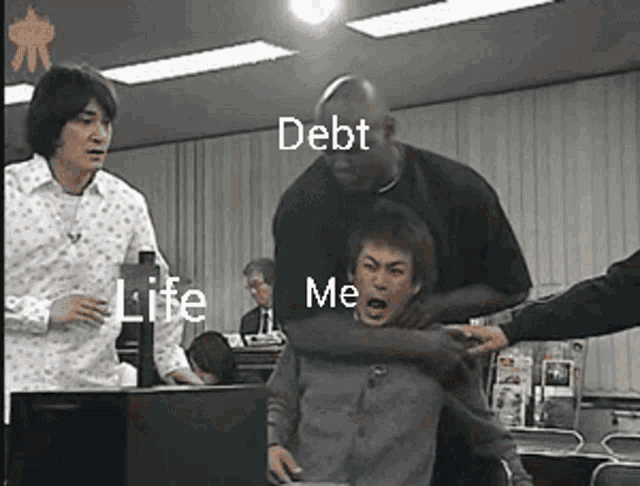
Thinking about investing your money is supposed to be a smart move.
But wait!
What if you have invested your money into a lucrative high-return investment option and meanwhile you met with an emergency?
How will you tackle these unseen, unexpected events without suffering if you have no other financial backup?
Here comes the need for an emergency fund because life can’t be predicted.
But, many people find themselves in a dilemma when it comes to creating funds for emergencies.
Go for an emergency fund or choose the market funds, promising high returns on investment?
If you are trapped in the same and want a clear mindset decide what to do first. I’ll offer some guidance to clarify your confusion about, ‘Should I build an emergency fund before investing?
In this article, you will understand What is an emergency fund, How much should you have in an emergency fund, Why is it important to make an emergency fund your first financial priority, and why might it be better to keep your emergency fund money in a separate account.
Are you ready? Let’s dive in.
What is An Emergency Fund?
Before going into the tug-of-war of emergency fund vs Investment, let’s remind ourselves exactly what is an emergency fund. As the name says itself ‘A fund reserve for emergencies’.
It is a bank account that is easily accessible and withdraws money at any time (without any penalty or charge) with reserve money kept aside for large/unexpected expenses.
The concept of an emergency fund is to protect you and your family from any financial crisis such as unforeseen medical expenses, unemployment or major home-car repair/replacement.
It is advised to beginners that before you think about investing extra income, first cover your essential securities.
The basic securities one must consider on top priority are Term Insurance, Health insurance and an Emergency fund.
The main purpose of an emergency fund is to establish a financial security for your family by creating a safety cover that can handle any unanticipated expenses.
Is It Worth Having An Emergency Fund?
The quick and simple answer to this is YES.
Many people don’t feel right to put their money into a ‘reserve’ instead of good returns market funds.
But an emergency fund doesn’t protect you from financial emergencies only but creates a financial cover too.
This cover will keep you safe in unanticipated financial needs and you won’t have to depend on extremely high-interest loans and credit card bills.
By having an emergency fund in your portfolio, you smartly reduce the risk of being in a challenging situation and possibly needing to go into any heavy debt.
In case you already have some debt, it is more important to have an emergency fund because it will help to avoid borrowing more debt.
How Can An Emergency Fund Reduce Stress?
An incident with a friend of mine will help you to understand this clearly.
In 2019 somewhere in oct-nov my friend sold a piece of land and grabbed more than 15 lakhs. His wife wanted to buy a new car but his father advised him to have a ‘back-up fund for hard times’.
He followed his father’s advice and took a term insurance plan of 50 lakh with family health insurance.
He deposited 6 lakhs in a short-term certificate of deposit (CD) and the other 6 lakhs rs in short-term debt Mutual funds.
In 2021 when COVID hit lethally his father couldn’t escape from it and got admitted to ICCU. God and those emergency funds blessed my friend’s family.
His father recovered from COVID and my friend escaped from costly medical bills.
A simple piece of suggestion saved a whole family. This single incident motivated other friends including myself to have an insurance and emergency fund.
This is how an emergency fund provides you with a financial net to live a less-stress/tension-free life, and a less-debt or debt-free future.
Reminding you again that an emergency fund should not be used for your personal amusement, to show off or for things you want to buy just to feel good.
Does Everyone Need An Emergency Fund?
Well, there is a chance that you will never meet with unexpected expenses, distasteful events or emergencies in life. But this probability is very rare.
Even if this is rare and the odds are in your favour, how will you know about these blessings? Certainly, no Tarot card reader or Astrologer is coming to forecast it for you. Are they?
You must understand it clearly, without a reserve saving for sudden expenses can cause a financial shock to anyone. Even if it is a minor shock, it will set you back.
Things can worsen if they turn into bank loans or high-interest debt. This can have a potentially long-lasting impact on your financial and personal life.
How?
Individuals without emergency funds struggle hard to recover from their financial setbacks. This tends to make even fewer savings to prevent upcoming emergencies.
Unfortunately, that can be insufficient if they face another emergency.
This is how they become more prone to huge debts. They rely on loans or credit cards which can lead to more debts that are normally even harder to pay off.
Such situations can be more tragic if they pull their other savings to cover their loans or debts as retirement plans or child education plans.
So next time you see someone asking ‘Should I have an emergency fund before investing?’, you have better reasons to help others.
But before offering that help to others let’s understand more about this Super friendly fund.
Why Create An Emergency Fund Before Starting to Invest?
Emergency funds are essential financial cover for a safe future, you must have agreed now. But why should it be on the priority list over investing?
Can’t we invest our money first to make more money and then with the help of this new money we should create an emergency fund?
No! don’t even think about it especially if you have no prior savings reserves.
As the name suggests emergency funds work when emergencies visit you uninformed and unforeseen. When they arrive they need immediate actions to be performed.
Investments are planned and anticipated in terms of returns. But Emergency funds are for your unplanned goals. You can’t even anticipat them at any stage of your age.
There are emergencies in one’s life such as job loss, physical-mental health issues, natural calamities, etc.
Even though you can arrange some financial help from others to deal with such situations, it could take some waiting period.
Suppose you are covered by health insurance for a medical emergency and the claim is taking time to settle but hospital bills are putting pressure on you to pay it instantly.
In this scenario, you will find yourself completely helpless and stressed. In all such cases, you must arrange savings funds to tide over these undesired emergencies.
If you invest your reserve money first rather than creating an emergency fund, you will be putting it all at risk, because when emergencies come you will be forced to pull money from your investments.
36% Americans have More Debt Than Emergency Fund
In a survey conducted in January 2024 by Bankrate and polling partner SSRS, 36% of American adults have more credit card debt than their emergency savings.
Meanwhile, 30% of them have increased their emergency savings compared to 2023.
Only 32% have seen a decrease in their emergency savings from the previous year 2023.
At a time of record high credit card rates, we see a record high number of Americans carrying credit card debt that exceeds their emergency savings.
– GREG MCBRIDE, CFA, BANKRATE CHIEF FINANCIAL ANALYST
Disadvantages of Not Having an Emergency Fund?
You may live without a car happily, but you should not live without a reserve account for unexpected surprises. If you do so, your financial happiness can end anytime.
If you haven’t figured out, ‘Should I invest or have an emergency fund first?’ and didn’t save for emergencies, there are five big reasons you can regret.
 1- Getting Stuck Into Huge Debt
1- Getting Stuck Into Huge Debt
When people don’t believe in creating emergency funds, they might get stuck into debt over time when emergencies hit them.
They often turn to credit cards, loans or borrowing from friends and family in the absence of emergency funds to deal with unexpected expenses.
2- To Deal With Increased Financial Stress
Emergencies are undoubtedly stressful. Not having an emergency fund can cause you to experience increased financial stress especially when sudden unexpected expenses keep arising.
3- Compromising the care
The absence of emergency funds can also jeopardize the quality of care you or your family receives during an unexpected medical treatment.
This can go wrong if the medical issue is serious and lacking funds can cause trouble to get medical attention on time.
4- May Not Be Able To Borrow
Many people strongly believe that there is no need to have an emergency fund. They can easily borrow money from others when emergencies meet them.
But that’s not always the case. There are chances you won’t get the required money on time when hard times hit you.
Other than this, suppose you lose your job or suffer no income, lenders are probably not interested in giving you their money.
Simply because they will see no source of income is sticking with you, which shows a red signal of not getting back their money on time.
5- Suffering Late Fees And High Interest
When you need urgent money for your emergency, you may struggle to get approved for an instant loan or other debt.
In such circumstances, you may be desperate to get a loan and forced to get it even if it costs you an extremely high interest.
On the other hand,
If you are caught up in a financial crisis where essential bills or payments can’t be afforded by yourself, you are forced to pay late fees or penalties too.
How Much Money Is Enough For An Emergency Fund?
There is no FIX rule for the ideal size of an emergency fund. The adequate size of Emergency funds varies on various factors.
Emergency funds depend on your monthly/annual income, the living cost of your family, your lifestyle expenditures, and the number of dependants in your family.
But a general rule of thumb is to create an emergency fund that almost caters to everyone.
It is advised to create an emergency fund equal to atleast 3-6 months of your salary. If you can manage try to save 6-9 months of your salary in emergency fund.
It is important to note this rule will work for you only when your monthly income is quite more than your lifestyle and monthly expenses.
If that’s not the case and you often take small loans to run your life, it’s better to accumulate at least 6 months of your expenses in that emergency fund.
This can be difficult for you but to avoid possible financial disaster in the future, you must accomplish this goal.
Why do you think it is recommended that you save 3-6 months of expenses in your emergency fund?
The answer is people with stable job security put their 3-6 months’ salary while those with less stable job security must save 9-12 months’ salary in their emergency fund.
Because a stable and secure source of income leads to bigger and more consistent emergency funds compared to an insecure job or inconsistent source of income.
How to Build An Emergency Fund In 7 Steps
1- Small Regular Saving Goals are Better
When you are new to saving for emergencies, it’s better to set several small or even smaller saving goals rather than ONE BIG.
You can easily be distracted or demotivated while accomplishing the big one. But if you save small in several modes, this will create a consistent saving habit in yourself.
Once you reach your first smaller goal, set the second and third goals even higher. By reaching your small goals consistently, you achieve your big target over time without failure.
2- Choose your Right Investment Option Carefully:
This is the second most important step for you while deciding on ‘Should I Build An Emergency Fund Before Investing?’
Your investment option for creating an emergency fund must be easily accessible in terms of withdrawing money when unplanned expenses knock on your door. These investment options must be reliable and stable.
The only place you should keep your emergency fund money is a separate reserve account.
While it is important to remember that savings options don’t give much returns, you should research well and pick the one that provides better returns on your savings.
And these saving options must be safe from market fluctuations.
3- Put Your Savings on AUTO MODE
The easiest and safest way to save your money from spending is not to see your money and touch it.
That’s so simple. Right! Savings work this way better only. You must set up a separate savings account only for your emergency fund. And regularly contribute to it automatically without missing anything.
Your emergency fund should go into your checking account, not a money market account.
4- Don’t Increase Your Monthly Expenses
This is a common mistake people often make. Once you automate your savings, don’t be lured to other tempting things that lead to increased spending.
You should save whenever you see a chance, even after contributing to your emergency funds without compromising your essential NEEDS.
This way you can keep motivating yourself while establishing your saving habit and extra savings help you to reach your target even sooner.
5- Invest in Insurance
Insurance is your big safety cover that provides a sense of peace when facing any sudden financial impact on your life. The term insurance covers your family in the absence of yours.
Health insurance covers your medical bills which can be a major setback to anyone financially. Car-home insurance provides aid when repair costs can’t be ignored.
Assess your insurance needs carefully with enough coverage and choose your service provider smartly.
6- Touch only in Emergencies
Establishing the habit of depositing in an emergency fund, strongly requires a greater discipline habit too.
Remember, your savings for emergencies are only for real emergencies, not the ones you make for your planned expenses.
Keep depositing in your emergency account and forget about it, until unforeseen events come and become financial threats.
7- Never Stop Enjoying Your Life
Many people dive deep into the habit of savings, they even forget their limits of reserving. This might affect their quality of life.
Having a sufficient emergency fund is crucial for anyone’s financial well-being. But during this journey, one shouldn’t forget to enjoy life.
Things that show off can be avoided but where you find true enjoyment within your budget without affecting your saving goals, must be done.
Save enough and have fun in your life, but never lose sight of your emergency fund. Keep trying to reach your financial savings goals as soon as possible.
Once you start creating your emergency funds and achieve this crucial goal for your financial life, you can start investing in good returns options.
You can cement your investing skills to get more benefits from the market by knowing ‘How to Invest with No Knowledge: 7 Easy Steps to Invest’.
FAQs
Do Emergency Funds Have Interest?
The main objective of an emergency fund should be easy access rather than maximizing interest earnings. It is important to keep long-term emergency funds, as they provide competitive returns on interest.
Which Investment Is Best For Your Emergency Fund?
It would help if you considered utilizing low-risk accounts. Opt for a High-Yield Savings Account, Money Market Account, Certificate of Deposit, Traditional Bank Account, or a Roth Individual Retirement Account for an emergency fund.
Should You keep Emergency Funds in Cash?
Keep your emergency savings in a liquid and easily accessible account. It is important to keep it distinct from your main savings account to avoid the temptation of using it for non-emergency purposes.
Can FD be Used as An Emergency Fund?
Utilizing fixed deposits as part of your emergency fund portfolio can help diversify your investments. When paired with liquid assets like savings accounts or money market funds, you can establish a well-rounded strategy for your emergency fund.
Conclusion
Investing can be a beneficial tool if you want to create wealth, but your life will be more peaceful if it is financially covered with an emergency fund’s safety net.
By being prepared to handle any unexpected, unplanned and undesired expenses, you can focus more on investing later on.
This way, your chances of succeeding in the market will increase, too.
Follow a simple rule. create an emergency fund, clear off your due debts, and start investing.
I hope this article has given you some insights into deciding your dilemma ‘Should I invest or have an emergency fund first?
If yes tell me in the comment section, will you start saving for an emergency fund now?
Note-:
The content is exclusively for educational purposes.
Investments in the securities market are subject to market risks. You must consult your advisor/expert before making financial decisions.
Kindly read all the related documents carefully before investing.

 1- Getting Stuck Into Huge Debt
1- Getting Stuck Into Huge Debt
